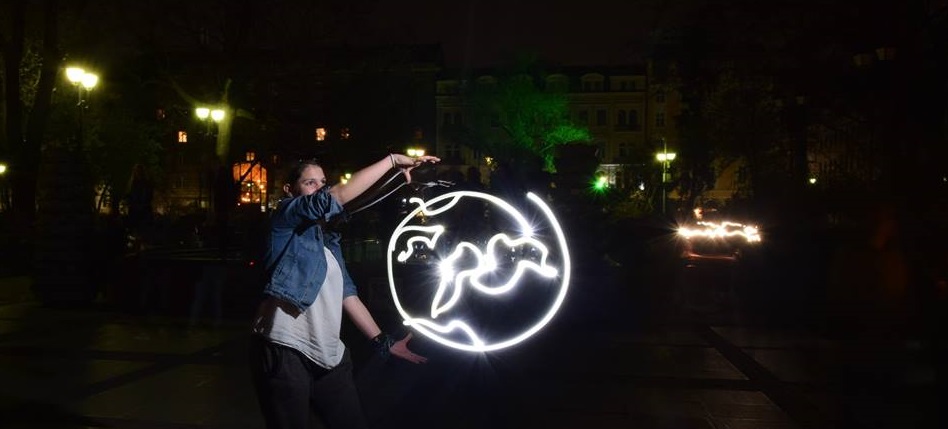LENA - More than 350 cities in Central and Eastern Europe celebrated Earth Hour
29-03-2017
Bratislava/Budapest/ Sofia/Bucharest/ Kiev - With the official support of over 350 cities across Romania, Bulgaria, Hungary, Slovakia and Ukraine, thousands of people celebrated Earth Hour in Central and Eastern Europe. Well-known landmarks and facades of government buildings turned dark to shine a light on climate action.
Bulgaria: A night mountain tour spotlighted the need to preserve the pristine Bulgarian mountains
In Bulgaria, over 170 people joined a ski trip in Vitosha Mountain, near the capital Sofia, to mark Earth Hour from high above the city. Climbing up and down the highest Cherni Vruh peak they had head lamps, skis, snowboards and sleds. Some joined on foot. The event linked to the case of Pirin National Park - one of the World Heritage sites in danger that WWF is working to preserve.
More than 100 Bulgarian municipalities, institutions and monuments switched off, including the office of the President, the Parliament, the Alexander Nevski cathedral. In the capital Sofia people celebrated Earth Hour with a fire show while artists were painting with light in front of the National Theater spreading the message of nature protection.
Hungary: An oath for sustainable living and development was taken
At the beginning of March, WWF announced that for Earth Hour 2017 any individual, company or organization may take an oath to preserve nature. The promise is to live environmentally friendly and sustainably. WWF’s friends and followers were invited to join a unique night hike to the Buda Hills in Budapest. More than 100 people participated in the trip and watched the city going dark from the top of the lookout tower on the highest hill. Together the participants swore the Earth Hour Oath while forming the 60+ symbol of Earth Hour. More than 80 cities participated in the festivities throughout the country.
Another initiative for Earth Hour in Hungary was a survey for municipalities to gather data what challenges they had with energy consumption and heating. The survey was publicly launched on 25 March and will continue until 6 April. After data is collected, a report will outline the possible solutions regarding energy efficiency and heating opportunities in the country.
Romania: ‘Give your natural energy’ was this year’s Earth Hour message
The spotlight of Earth Hour in Romania were once again green energy solutions. The campaign message Give your natural energy called for environmentally friendly policies and nature protection. Thousands of bikers went out in the main boulevards in Bucharest to focus public attention onto nature-friendly means of travel. Some 60 cities participated in the festivities throughout the country with celebrations and events promoting sustainable living. There were also music events and turning off the lights of public buildings.
Ukraine: Earth Hour supports the protection of protected areas
More than 50 cities supported the Earth Hour campaign in Ukraine. This year the celebrations raised awareness about nature parks and biodiversity protection. WWF activities were organized together with the Holosiivskyi National Nature Park in Kiev. Nature Ambassadors and WWF invited people to plant trees, join clean-up activities, learn about oaks and build houses for bats. WWF also organized a contest for schools asking for the best idea for cooperation with nature parks. The winner will have the opportunity to implement their idea.
Dozens of cities, local NGOs and activists marked the Earth Hour with acoustic concerts, fire shows, ecological master classes at schools, events in national parks and bicycle tours. Significant landmarks such as the Motherland Monument in Kiev, the Opera and Ballet Theatre in Odessa, St. George's Cathedral and others switched off their lights for Earth Hour.
Slovakia: Calling for a green way of living
In Slovakia, 40 cities and 40 historical buildings and landmarks - including a UNESCO World Heritage site, supported Earth Hour. In Bratislava, the Earth Hour celebrations raised awareness about the green way of living and sustainable choices in our everyday life. WWF invited families to produce energy on stationary bikes, school children were making their own lanterns, and a drum band was teaching kids how to re-invent waste and recycle it. During the day, people were able to join activities that took place at IKEA’s store in Bratislava and fill an online quiz about sustainable living. The official part of the evening was marked with a concert, a fire show, a bike night ride, and a projection of iconic species of Slovakia like lynx, wolf and bear onto facades in the historical city center.
And across the world
An unprecedented 187 countries and territories across the world came together for WWF’s Earth Hour and showed support for action to protect our amazing planet. The record participation is a fitting celebration for the movement’s tenth anniversary and comes at a time when the need for climate action is greater than ever. Online, #EarthHour and related terms generated over 1.1 billion impressions in 24 hours, trending in at least 30 countries worldwide.
Images from Earth Hour events around the world can be found here and video footages are available here.
To know more about WWF’s work on climate policy and action, please visit http://wwf.panda.org/what_we_do/footprint/climate_carbon_energy/
Reference: www.panda.org/dcpo

